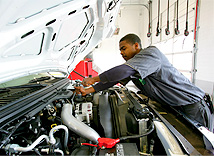10-Minute Oil Change
What’s different about an Express Oil Change?
Our standard oil change offers a premium value. Not only is it one of the quickest, most convenient services you will find, we put your car through a 20-point series of tests and checks.
Our hood technician replaces your oil and oil filter and checks all the fluid levels under your car’s hood including windshield wiper fluid, anti freeze, etc, and brings them to the proper levels.
The hood technician also visually looks for wear of important belts and hoses and checks the air filter for its condition.
Underneath the car, the pit technician drains the old oil and lubricates the chassis which ensures that proper steering and suspension components perform well. The pit technician is also able to see certain parts under the car that need regular maintenance.
The hood technician also performs a safety inspection during which your lights, signals and horn are checked.
If there are any potential causes for concern or your mileage indicates certain services may be recommended by your car’s manufacturer, they will make you aware of these and share this information. You can feel comfortable that our teams never up sell or pressure you to purchase additional parts or services. We also let you know when the systems and parts look to be in good shape and your car has a clean bill of health. We perform these additional checks for your own awareness. Any recommendations and suggestions are communicated to make you aware of your car’s needs. To not communicate what we find would be irresponsible.
Just as important as what we do, is what we don’t do.
- We don’t waste your time. Our oil change is so fast you do not have to get out of your car. Our service department does not require a prior appointment and most services are completed the same day.
- We do not deep discount our oil change, only to sell you unnecessary services that create a higher total charge.
- We don’t use pressure tactics that have unfortunately become prevalent in the auto services industry.
- We never recommend any service that is not needed.
Why change every 3,000 miles?
A regular oil change is the single most significant automotive service that you can do to keep your car performing well and extend the life of your engine.
To better understand why most cars need an oil change every 3,000 miles is to understand the major difference between what the automotive industry considers "normal" driving and "severe" driving. The Automotive Association of America (AAA) defines normal driving conditions as highway driving on paved roads in relatively dust free areas. Severe driving is defined as trips less than 10 miles, stop and go city driving causing brakes to be used frequently, driving in extremely cold weather, dusty driving conditions, towing a trailer or idling for long periods of time. As you can probably relate, severe driving is the norm for most individuals.
Even so, many manufacturers still use the interval for normal/ideal driving conditions in their manuals.
According to Women Motorist, “Unless you drive mostly highway miles, today’s engines will run better and last longer with clean oil every 3,000 miles or 3 months, including a filter change."
“Oil eventually loses its ability to lubricate, clean and flow freely. Each function is extremely important to the life of the engine. Changing the oil every 3,000 miles is 'cheap insurance' with an extremely high cash value.”
Responding to a questionnaire by ASE, over 90% of mechanics surveyed said the number one thing to maintain your vehicle is changing the oil every 3,000 miles.
Lastly, it’s important not to overlook the other benefits of a 3,000 mile oil change. The average age of vehicles on the road is 12 plus years and that average continues to increase. We are keeping our cars longer and driving more miles, so we all need to have regular maintenance checkups in order to make sure that systems and components are in good working order. Express Oil Change & Service Center’s travel checks and normal inspections are a part of every oil change and can help identify a preventative issue before it becomes a costly repair or breakdown.


